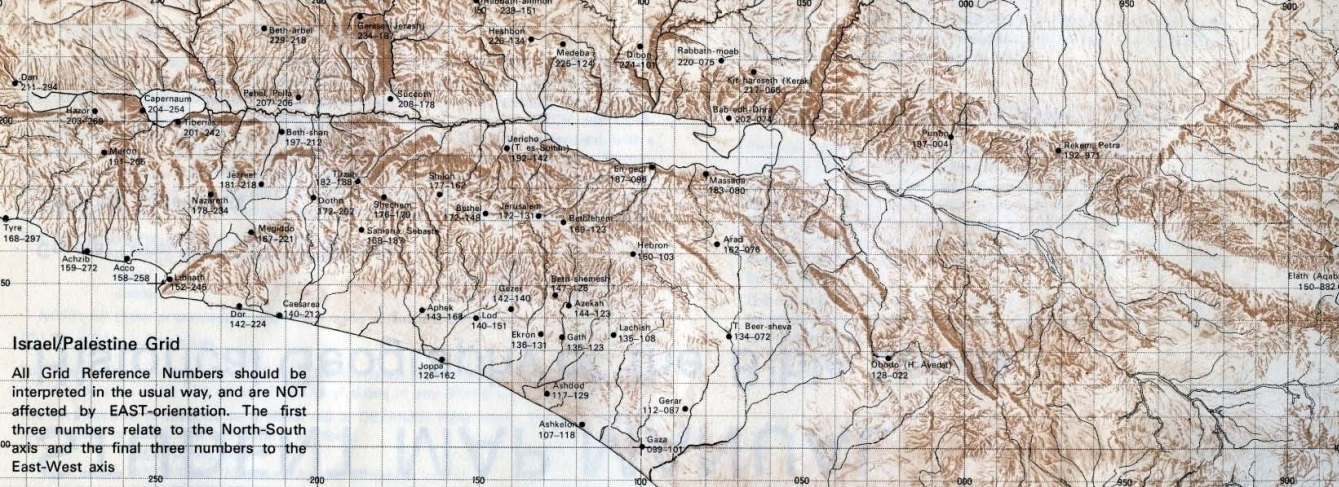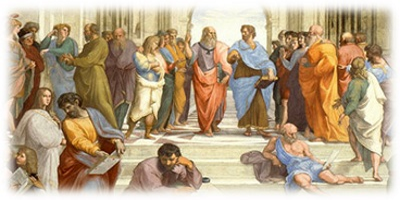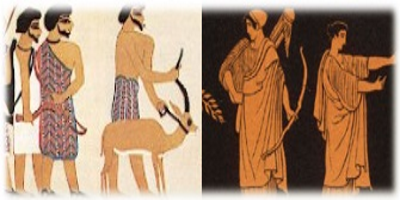The eastern mind is not obsessed with time as the western mind is. Anyone who has lived and worked in the near or Middle East knows that they are event oriented rather than time oriented as we westerners. Their lives are not ruled by the clock. The tenses in Hebrew and Arabic and as well in the Greek are not primarily concerned with time but rather flow or type of action.
The ancient Hebrew words that are used to describe distance and direction are also used to describe time. The Hebrew word for east is qedem and literally means "the direction of the rising sun."
The implications of this statement are astounding. This is because time, as defined as the distance between two physical events, is not a physical measurement in and of itself. Yet in ancient Hebrew, time and distance refer to the same thing and literally to "the direction of the rising sun," (which we as human beings call the east direction). One implication of this association would be that the origin of all things could have come, does come, and will come from the east.

This map was taken from "Student Map Manual" Historical Geography of the Bible Lands" – J. Monson. It was one of the textbooks used at a school in Jerusalem – the name eludes me at this time but they no longer exist.
Under the map shown above was this caption (which sparked this study and I just found after 25 years):
"All pictorial archive mapping is EAST- oriented. This is not as heretical as it might first appear. The Bible itself is East oriented too, as the Hebrew words for the points of the compass indicate..."
- ים / yam – west, sea
- קדם \ qedem – east
- תימן \ teman – right, south
- שמאל \ smol – left, north
"We use north as our major orientation such as in maps which are always oriented to the north. While we use the north as our major direction, the Hebrews used the east and all other directions are oriented to this direction. For example, one of the words for south is teyman from the root yaman meaning "to the right."
Theological Wordbook of the Old Testament (TWOT)| 1988.0 | קדם | (qadam) meet, confront, go before. (Piel and Hiphil only). Denominative verb. |
| (1988a) | קדם | (qedem) east, antiquity, front. |
| (1988b) | קדם | (qeydem) east. |
| (1988c) | קדמה | (qadmah) antiquity, former estate, before. |
| (1988d) | קדים | (qadim) east wind, east. |
| (1988e) | קדמון | (qadmon) eastern (Ezek 47:8, only). |
| (1988f) | קדמני | (qadmoni) former, ancient, eastern. |
| (1988g) | קדום | (qadum) antiquity. |
The word qedem is also the word for "the past." In the ancient Hebrew mind the past is in front of you while the future is behind you, the opposite way we think of the past and future.
H. W. Wolff likens the Hebrew conception of time to the situation of a man rowing a boat. He sees the past as before him (qedem); the future is behind his back (aharit).
Qedem - East, antiquity, front. The noun qedem has either a geographical meaning, "east," or a temporal notion "ancient time, aforetime." This noun occurs sixty-one times.
The "East" may have either good or bad connotations - on the one hand it is the location of Eden, but on the other hand, it was the habitat of the men who built Babel (Gen 11:2). When denoting the dwellers E or NE of Canaan, it frequently refers to tribes hostile to Israel (Num 23:7; Jud 6:3, 33). But the prophets envision a day when they will be subject to Israel (Isa 11:14).
Qedem - East. This noun may be simply qedem plus a final he expressing direction toward (GKC sec. a, c,) with which it always occurs. This noun occurs twenty-six times. It should be compared with mizrah (where the sun rises), which emphasizes location rather than direction.
Qadam - Antiquity, former estate. This is the abstract noun form of the derived meaning (ancient, former) of qedem. Our word occurs five times.
Qadim - East wind, east. This noun denotes the desert wind which brings feared destruction (Job 27:21; Psa. 48:7 [H 8]), and which is, nonetheless, absolutely controlled by God (Job 38:24; Psa. 78:26) even for good (Exo. 14:21) when he so desires. Occurring in Ezekiel fifty-two times, the most frequent usage is "east" (cf. Hab. 1:9) perhaps a dialectical variant for qedem. The word occurs sixty-nine times.
Qadmoni - Former, ancient, eastern. This is the adjectival form of qedem. It occurs ten times.
Genesis 2:8
The LORD God planted a garden toward the EAST, in Eden; and there He placed the man whom He had formed. (Why the east – He could have just as well planted Eden in the South, North or West. There has to be a reason Eden was planted in the EAST)
Genesis 3:24
So He drove the man out; and at the EAST of the garden of Eden He stationed the cherubim and the flaming sword which turned every direction to guard the way to the tree of life. (Life, the Tree of Life is in the EAST. Life comes from the EAST)
Numbers 2:3
"Now those who camp on the EAST side toward the sunrise shall be of the standard of the camp of Judah, by their
armies, and the leader of the sons of Judah: Nahshon the son of Amminadab, (Judah is the tribe Jesus, The Messiah
descended from Judah)
Ezekiel 10:19
When the cherubim departed, they lifted their wings and rose up from the earth in my sight with the wheels beside them; and they stood still at the entrance of the east gate of the LORD'S house, and the glory of the God of Israel hovered over them. (The glory of the LORD was over them on the EAST side of the Temple)
Ezekiel 11:23
The glory of the LORD went up from the midst of the city and stood over the mountain which is EAST of the city. (This is a reference to the Mount of Olives, which is EAST of Jerusalem – which is where Messiah will come to earth – Zech. 14:1-4, further down)
Ezekiel 41:14
Also the width of the front of the temple and that of the separate areas along the EAST side totaled a hundred cubits. (The front entrance to the Temple faces EAST)
Ezekiel 43:1-4
Then he led me to the gate, the gate facing toward the EAST; and behold, the glory of the God of Israel was coming from the way of the EAST. And His voice was like the sound of many waters; and the earth shone with His glory. And it was like the appearance of the vision which I saw, like the vision which I saw when He came to destroy the city. And the visions were like the vision which I saw by the river Chebar; and I fell on my face. And the glory of the LORD came into the house by the way of the gate facing toward the east. (The glory of the Lord came into the house by the way of the EAST. Very profound in the connection with time, east, the future and the past)
Ezekiel 44:1-2
Then He brought me back by the way of the outer gate of the sanctuary, which faces the EAST; and it was shut. The
LORD said to me, "This gate shall be shut; it shall not be opened, and no one shall enter by it, for the LORD God of Israel has entered by it; therefore it shall be shut. (The Eastern gate has been shut and bricked over by the Arabs – what are they afraid of?)
Ezekiel 47:1
Then he brought me back to the door of the house; and behold, water was flowing from under the threshold of the house toward the EAST, for the house faced east. And the water was flowing down from under, from the right side of the house, from south of the altar. (The River of Life - because the water which flows out from the Temple)
Zechariah 14:4
In that day His feet will stand on the Mount of Olives, which is in front of Jerusalem on the EAST; and the Mount of Olives will be split in its middle from east to west by a very large valley, so that half of the mountain will move toward the north and the other half toward the south.
Matthew 2:1-2
Now after Jesus was born in Bethlehem of Judea in the days of Herod the king, magi from the east
arrived in Jerusalem, saying, "Where is He who has been born King of the Jews? For we saw His star in the EAST and
have come to worship Him."
Matthew 24:27
"For just as the lightning comes from the EAST and flashes even to the west, so will the coming of the Son of Man be.
These are just a few of the Scriptures where we see the word "east." It would be an additional benefit to see if any more contain this concept that we have examined so far.
"Olam" עולם a long time or duration
The main component of עולם's meaning is according to common consent "most distant time," with reference both to the past and the future, and occasionally to both.
One way of expression "forever" can be found in the expression "forever and forever" - Blessed be the name of God forever and ever (Dan. 2:20)
The Complete Jewish Bible correctly translates this Hebraic concept correctly:
Daniel 2:20 in these words: "Blessed be the name of God from eternity past to eternity future! For wisdom and power are his alone;
This explains why עולם is not only being used to designate subsequent and future time (Gen 13:15; Exod 14:13; Deut 13:16; 23:3; 29:29; Josh 8:28; Mic 4:7), but also remote antiquity (Gen 6:4; Deut 32:7; Mic 5:2 [1]). All time is related to the action in history of the living God (Joel 2:1-11)
The meaning "forever" is paralleled with the expression "for a thousand generation(s)" 1 Chron. 16:15 – note – the Hebrew word for generation in this verse is "dor" – דור and it is singular. To express "forever" more precisely one can find the phrase – דור ודור "forever, from generation to generation – dor va'dor
Just another side note: דור (dur) circle, ball. Occasionally there is a Hebrew word wherein etymology, as a route to discovery of ancient thought patterns, is all - important in discovering the true life - situation in which the word must be understood. Such is the case here. Authorities all agree that dor, the noun, is derived from dur, the verb. The simple primitive sense, not expressly found in any biblical text, is to move in a circle, surround. Since ashes, grain, meal, etc., when heaped up form a circle on the floor, ancient Semites used this word for "to heap up" or "to pile something" - thinking graphically of the shape of the heap at its base, rather than as we, of the height or outline of the elevation created. Also, since houses were usually a group of rooms surrounding a central court, and perhaps since some very early houses were circular, the word was employed with the meaning, to dwell.
| ימן | (yaman), - go/turn to the right |
| תמין | (teman) I, south, southward. |
The right was usually the position of honor, privilege, and preference. Joseph set Manasseh at his left, and so at Israel's right, when he brought his sons to be blessed. He then tried to correct his father's apparent mistake when he crossed his hands to give Ephraim the greater blessing (Gen 48:13-18). Both Joseph and Israel clearly understood the right hand as superior to the left. Solomon seated Bathsheba to his right (1 Kgs 2:19; cf. Ps 45:9 [10]), and Yahweh told David's אדון to sit at his right (Ps 110:1).
An interesting comparison in different languages is that that Egyptian word for right is also for west – Egyptians oriented their directions based on the source of the Nile which was from the south.
This is also very interesting. How can the human mind comprehend events that have already occurred (the past) which is in front or ahead of us, with events that are yet to occur (the future) which are behind us and have yet to occur? Unless the implication of ancient Biblical Hebrew is that there is a tie or a connection between the past and the future.
The Hebrew word olam עולם means in the far distance. When looking off in the far distance it is difficult to make out any details and what is beyond that horizon cannot be seen. This concept is the olam. The word olam is also used for time for the distant past or the distant future as a time that is difficult to know or perceive. This word is frequently translated as eternity or forever but in the English language it is misunderstood to mean a continual span of time that never ends. In the Hebrew mind it is simply what is at or beyond the horizon, a very distant time. A common phrase in the Hebrew is "l'olam va'ed" and is usually translated as "forever and ever" but in the Hebrew it means "to the distant horizon and again" meaning "a very distant time and even further" and is used to express the idea of a "very ancient" or "future time."
Conclusions
- If one word can refer to past and future events interchangeably then, again then there must be an implied connection of the future to the past in Biblical Hebrew.
- The universe = time = the past = the future = the east = the beginning and end of all things = the origin of all things = where God is

Like what you’re discovering? Continue the journey from Bible reader to translator.
|






